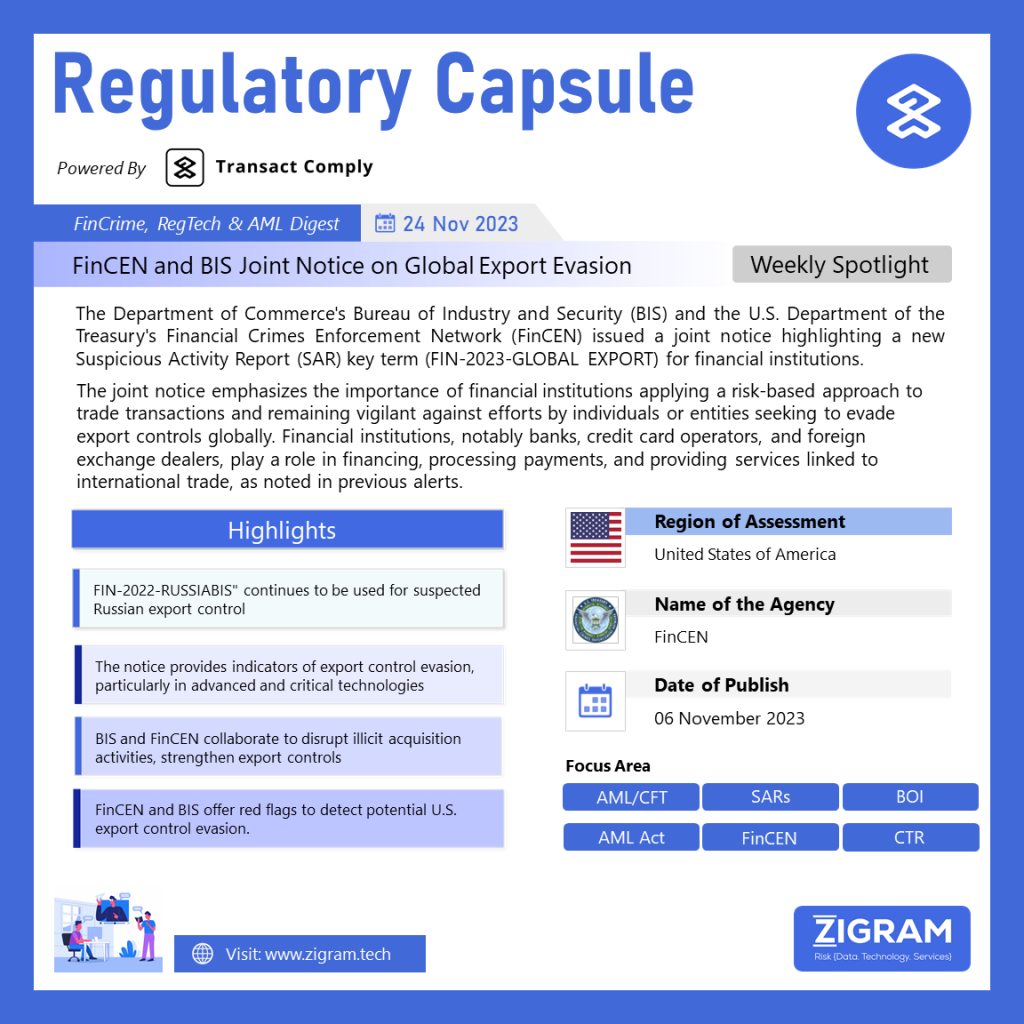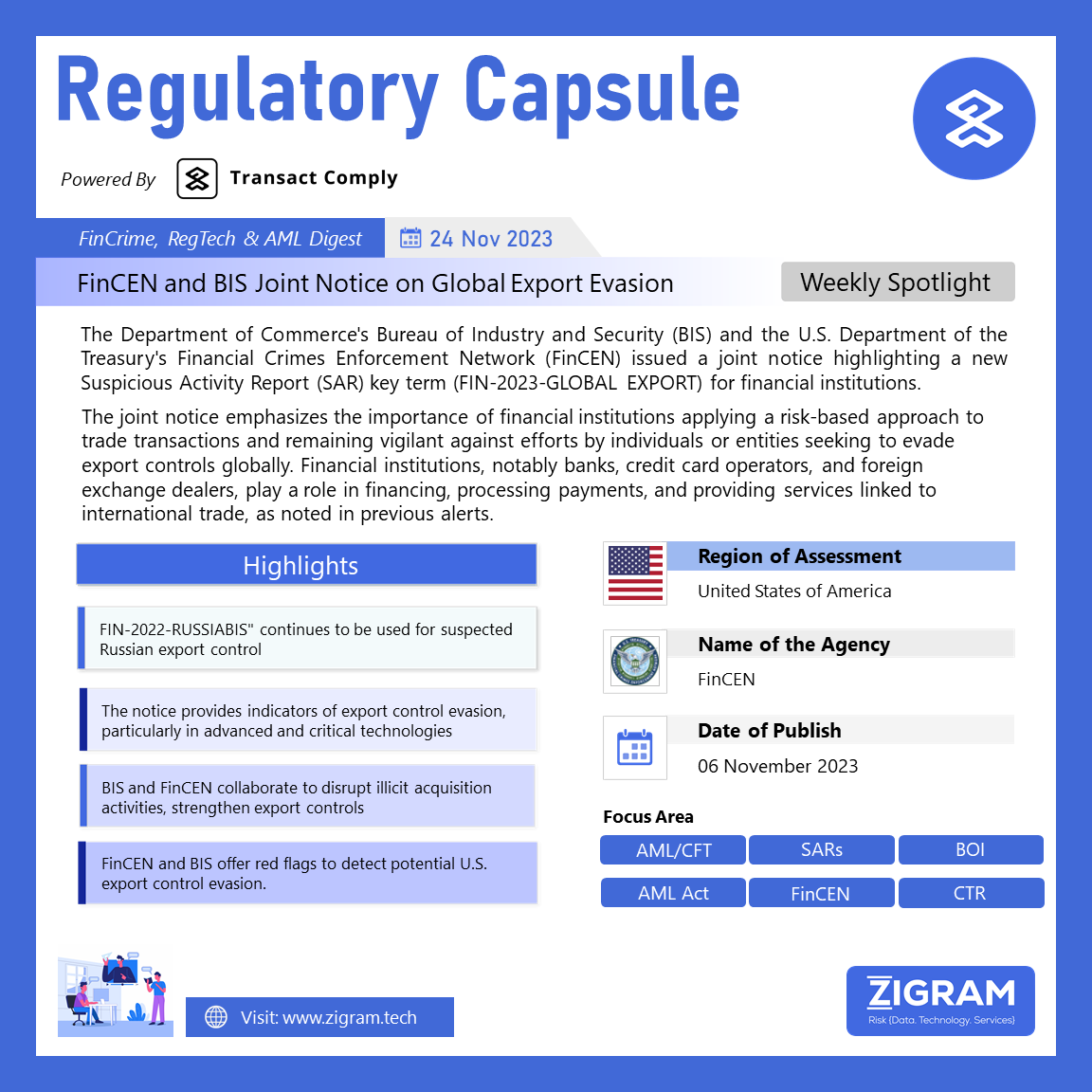Published Date:
The Department of Commerce’s BIS and Treasury’s FinCEN issued a joint notice introducing a new SAR key term, “FIN-2023-GLOBALEXPORT,” to address global evasion of U.S. export controls unrelated to Russia’s invasion of Ukraine. Financial institutions are reminded to use “FIN-2022-RUSSIABIS” for Russian export control evasion. The notice underscores the importance of a risk-based approach to trade transactions, urging vigilance against evasion efforts worldwide. FinCEN and BIS are offering a set of red flags to aid financial institutions in detecting transactions linked to the evasion of U.S. export controls. These indicators, combined with those from previous alerts related to Russia, help assess if an activity may be associated with export control evasion. It’s emphasized that no single red flag guarantees illicit activity, and a comprehensive evaluation of the transaction’s surrounding context is crucial in determining its suspicion or potential connection to export control evasion. FinCEN and BIS are providing a select list of red flags below to assist financial institutions in identifying transactions potentially tied to evasion of U.S. export controls
1- Purchases made with a letter of credit and assigned to the issuing bank rather than the real end user. Furthermore, supporting documents, such as a commercial invoice, do not include the name of the real end-user.
2- Transactions involving entities with little or no web presence, such as a domain-based email account.
3- A consumer fails to provide or refuses to provide information to banks, shippers, or other parties, such as end-users, intended end-use(s), or corporate ownership.
4- Transactions involving consumers whose phone numbers have country codes that do not correspond to the destination country.
5- Transaction parties identified as ultimate consignees or in the “consign to” section appear to be postal centers, trading companies, or logistics firms.
6- The item (commodity, software, or technology) is inappropriate for the purchaser’s industry.
7- The customer’s name or address is similar to one of the parties listed on a prohibited parties list, such as the BIS Lists of Parties of Concern (e.g., Entity List, Unverified List, Denied Persons List), the Treasury’s List of Specially Designated Nationals and Blocked Persons (SDN List), or the State’s Statutorily Debarred Parties List. Linkages to weapons of mass destruction programs or military-intelligence end-users or end-uses involve broader controls regardless of whether an item is subject to the EAR, therefore special attention should be made to the justification for listing on the Entity List or SDN List.
8- Transactions involve an ostensibly civil end-user, but preliminary research shows that the address is a military facility or is co-located with military installations in a country of concern.
9- Transactions between companies that share physical space or ownership with a company on the company List or the SDN List.
10- Transactions involving open accounts/open lines of credit where payment services are provided in combination with known transhipment jurisdictions and/or the products indicated in payment memoranda correspond to those defined by BIS as disruptive technologies featured on the CCL.
11- Based on recognized market prices, the consumer is significantly overpaying for an item.
12- Transactions involving a last-minute change in payment routing from a country of concern but now routed through a new country or company.
13- Transactions involve payments from companies positioned at probable transhipment points or unconventional shipping routes to a destination.
- #FinCEN
- #ExportControlEvasion
- #BIS
- #FinancialSecurity
- #RedFlags
- #RiskManagement
- #NationalSecurity
- #FinancialInstitutions
- #SuspiciousActivity
- #GlobalTrade
- #Compliance
- #FinancialIntelligence
- #IllicitTransactions
- #SecurityAlerts
- #RiskAssessment


